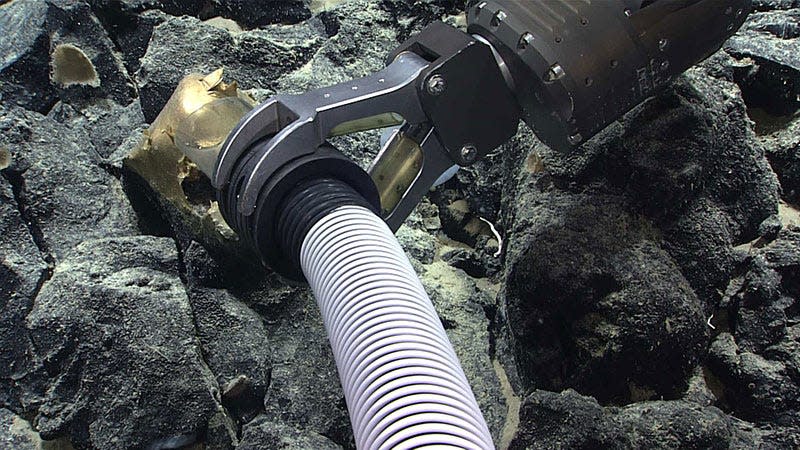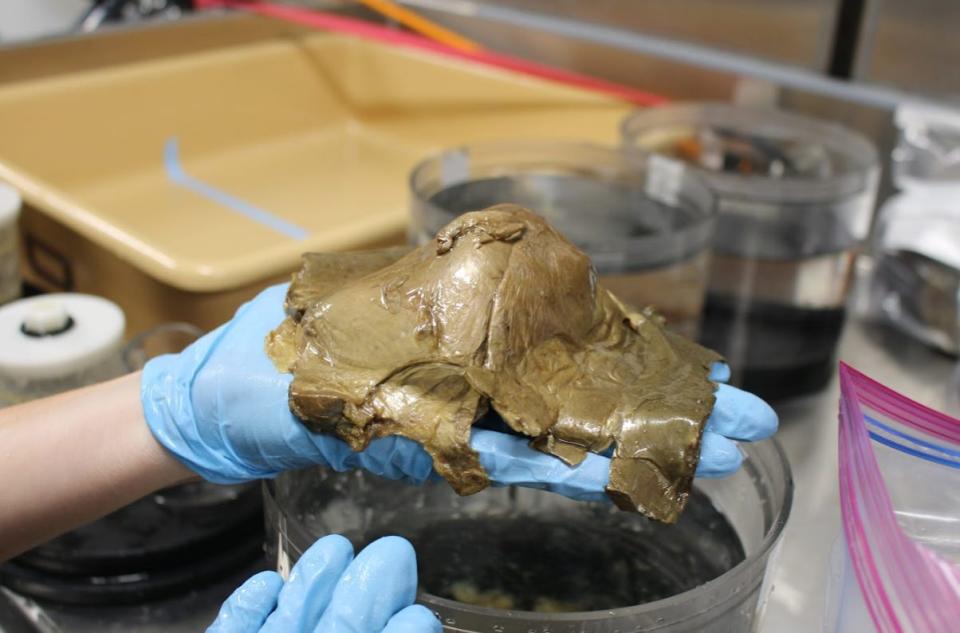Shiny 'golden orb' found 2 miles deep in the Pacific stumps explorers: 'What do you think it could be?'
A strange object resembling a smooth golden orb that deep sea explorers found last week off the Pacific coast of Alaska has so far defied scientific explanation.
Researchers at the the National Oceanic and Atmospheric Administration (NOAA) made the discovery Aug. 30 while using remotely operated vehicles to scour the seafloor as part of a larger ongoing expedition to record and study areas never before been seen by humans.
While gliding the device over a rocky outcrop two miles underwater, team members aboard a NOAA ship came across what one of them initially described as a "yellow hat." But upon closer inspection, the object attached to a rock appeared "smooth, gold (and) dome-shaped," NOAA said in a news release.

The perplexing find stumped the team, who more than a week later are still unraveling the mystery − is it a sponge attachment? Coral? An egg casing? As the mysterious object captures the public's attention, even NOAA's official research account has gotten in on the fun, posting on X, formerly Twitter, that scientists are “trying to crack this golden egg mystery!”
Scientists aboard #Okaneos are trying to crack this golden egg mystery! What do you think it could be?? https://t.co/cpsrUOaGxh
— NOAA Research (@NOAAResearch) August 31, 2023
'Golden orb' found during Alaskan expedition is biological in nature
Marine researchers found the golden unidentified specimen during NOAA's ongoing Seascape Alaska 5 expedition in the state's gulf.
The expedition commenced Aug. 23 off Kodiak Island conducting focused mapping and exploring depths of up to four miles with remotely operated vehicles. NOAA researchers aboard the Okeanos Explorer ship expect to conclude the expedition Sept. 16 about 350 miles north near Alaska's southern port city of Seward.
The golden object was found amid white sponges and had a small hole or tear near its base that revealed a similarly-colored interior, NOAA said. Deploying a remote-controlled sub, the team was able to essentially suction the object up a tube in order to test it in a lab aboard the ship.
Testing revealed the orb to be biological in nature − but not much else.
While the scientists were able to bring the orb to the surface, expedition coordinator Sam Candio said they won't know more until they examine it in a laboratory with more sophisticated tools than what's on the ship.
“While we were able to collect the 'golden orb' and bring it onto the ship, we still are not able to identify it beyond the fact that it is biological in origin," Candio said in a statement. "While somewhat humbling to be stumped by this finding, it serves as a reminder of how little we know about our own planet and how much is left to learn and appreciate about our ocean.”
Ancient meteorite: This meteorite is 4.6 billion years old. Here's what it could reveal about Earth's creation

'Isn’t the deep sea so delightfully strange?'
Bringing it from the depths of the sea also revealed that the fleshy specimen about 4 inches in diameter was more brownish than gold.
Candio said discovering new deep sea species has "the potential to reveal new sources for medical therapies and vaccines, food, energy, and other societal benefits and knowledge."

Candio said it's still unclear if the "golden dome" is from a known species or an undiscovered one. Another possibility, he said, is that the dome is part of an unknown life stage of an existing species.
Whatever it is, its discover led Candio to conclude, "Isn’t the deep sea so delightfully strange?”
'Eight-legged roommate'? It's spider season. Here's why you're seeing more around the house
NOAA Pacific expedition livestream
Viewers can watch a live feed of the dives from 12 p.m. to 9 p.m. ET daily through Sept. 15 at www.oceanexplorer.noaa.gov/livestreams/welcome.html or on the expedition's YouTube page.
Eric Lagatta covers breaking and trending news for USA TODAY. Reach him at elagatta@gannett.com.
This article originally appeared on USA TODAY: NOAA scientists stumped by 'golden orb' found in Alaskan ocean: Video


